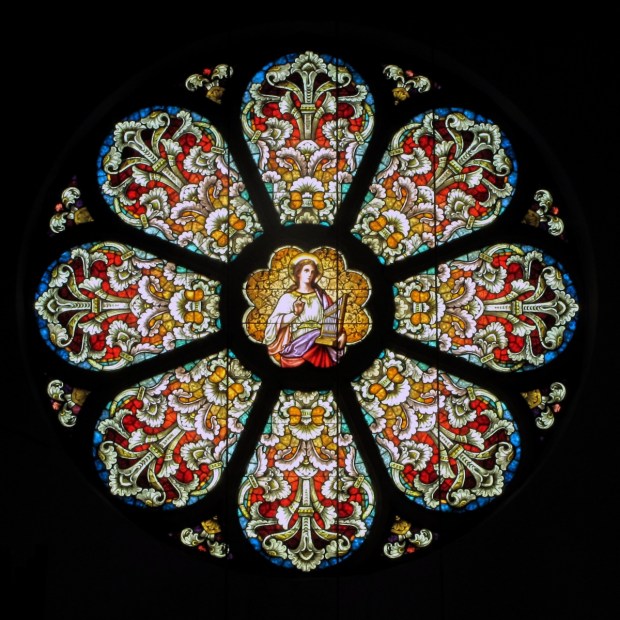When the President of Emil Frei & Associates, Aaron Frei, mentioned that stained glass is one of the longest lasting materials in a church, I immediately saw the parallel to the Frei studio’s long history. The Frei studio has created beautiful stained glass for five generations. The history of their family and artistic vocation gives us a -- excuse the play on words – a window into why stained glass enjoys such prominence in Catholic churches around the world.
I am the fifth consecutive generation to lead the studio. I work alongside, and am greatly fortified, by three of my siblings. As you might well imagine, every generation is raised in an environment and culture where images, architecture, community, and material beauty impress this indelible mark upon you. And which transmits the faith in a tacit but visceral way.
Aaron says that he started working in the family studio at 11, but he and his siblings had been surrounded by art and beauty their entire lives.

How a family tradition began
Aaron’s great-grandfather, Emil Frei, Sr., was born in Bavaria in 1869 and embraced an artistic vocation early on. He studied a variety of mediums - including stained glass - at the Munich Academy of Fine Arts and gained a profound appreciation of the role of sacred art. He immigrated to the United States in the early 1890s, where he painted murals in San Francisco for several years. Here, Aaron shares a providential twist to the Frei history:
Emma and Emil felt the homesickness common to any new immigrant. They made the difficult decision to return to Germany. But before doing so, they made a stop in St. Louis to visit some old German acquaintances. Upon stepping off the train, they heard nothing but German being spoken. It was the sign that they needed, and they decided to settle right here in St. Louis. The Lord works in strange ways.
The Freis delved into the creation of stained glass in 1898. The family has been conceptualizing, creating, and installing these works of art in churches ever since. Through the generations they’ve developed a strong understanding of why stained glass matters and have seen the fruits of their labor in sacred spaces across the country.

Stained glass: a sacred artform
Aaron explains that stained glass doesn’t always serve one single function in a church - educational, catechetical etc. Rather:
Sacred Art, at its root, envelopes the whole of human existence. At times, that means that it will aid in the public worship of the Liturgy. At other times, it will inspire us by its natural beauty in our private devotion. Very often, it will strengthen us in our understanding of the faith.
He adds:
Our very purpose is to help others come to Christ through the form of beauty and substance of truth. It is to draw others into a relationship with Christ. This should be the aim of every artist serving the Church.
Look "and then look at it more."
He echoes the words of St. John the Baptist who said, “He must increase; I must decrease,” adding that the vocation of the artist is not to seek fame, but more commonly to be anonymous to history. Their role is to “Receive the wonders of His created beauty, work with them, and then render them back unto God in a common song of praise.”
The Frei studio engages in several different styles, depending on the architecture of the church and the desires of the pastor and parishioner. The artists at Frei & Associates are always seeking ways to have worshippers connect more with the art:
We want people to look at (the window) and then look at it more. Similar to icons, you want it to be a mode of prayer, enter more deeply into it, engage with it. We try to include things in the window that the viewer may not immediately discern are there but draw them into closer examination.

Details upon details
He illustrates this process of hidden details that lead the viewer to greater reflection.
In the church of St. Francis De Sales, there is, in the apse, a window of St. Thomas Aquinas. It starts 20 feet off the floor and extends another 20 feet up into the air. In his hand resides the chalice. In the reflection of that chalice is the nave aisle of the church itself. It is a very minute detail, but one that contains such rich symbolism and theology! Here we have the notion of the Body of Christ, in both its sacramental and ecclesial dimensions, being conflated in a way that only art can deliver -- that is to say, in a way utterly poetic. The faithful are united into the one Body of Christ through their common participation in the Eucharist.

The next time you enter a church, spend a little time with the stained-glass windows --perhaps with a baby who loves the streaming colorful light, or with a child who can learn something new from its beautiful scenes, or by yourself in contemplative prayer.










